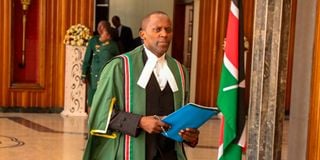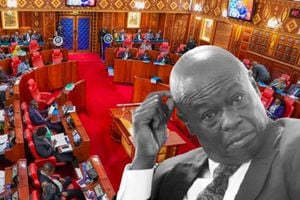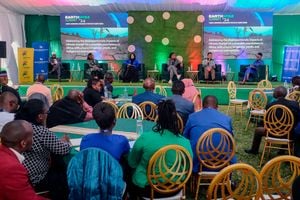
Clerk of the National Assembly Samuel Njoroge.
The National Assembly is now considering conducting public participation in all 290 constituencies for all contentious Bills before they become law.
Following the recent public hearings on the impeachment motion against Deputy President Rigathi Gachagua, the House says all Bills that will affect the people will henceforth be subjected to such rigorous exercise.
Clerk of the National Assembly, Samuel Njoroge, told the Nation that they now intend to engage the public more through forums organised at the constituency level and not just in hotels in Nairobi.
“Going forward, we will use the constituency offices and staff to engage the public on Bills that we consider controversial, popular and those that have a direct effect on the people. We will go to the people and engage them and respect their views,” Mr Njoroge said.
He said some of the bills that the House intends to fully engage the public on include the Finance Bill, the Constitutional Amendment Bill and all bills relating to taxation and the public sector.
“We have officers at the 290 constituencies and the 47 offices belonging to the woman representatives who are paid by the Parliamentary Service Commission (PSC). We will use them to engage more with the public going forward,” Mr Njoroge said.
Parliament's change of heart on public participation comes after the institution suffered many setbacks in the courts following the nullification of some laws passed for lack of sufficient public participation.
Some of the laws passed by parliament but nullified by the courts include the Privatisation Act, the three Health Acts and the Instruments Act, 2013.
On July 12, 2024, the High Court issued orders suspending the Social Health Insurance Act, 2023, the Primary Health Act, 2023, and the Digital Health Act, 2023 for 120 days, during which Parliament was directed to undertake sensitisation, adequate, reasonable, sufficient and inclusive public participation before enacting the three laws.
Parliament has been accused of ignoring the views of the public in most cases, such as the Finance Bill, 2024, where the public sent thousands of memorandums opposing most of the proposals in the Bill, but MPs ignored them and went ahead to pass it.
However, President William Ruto refused to assent to the bill after sustained protests in the country led by the youth.
Currently, there is the Public Participation Bill, 2024, sponsored by Majority Leader Kimani Ichung'wah, which seeks to provide a framework for effective public participation.
The Bill seeks to give effect to the constitutional principles of public participation and participatory democracy as enshrined in Articles 1, 10, 35, 69, 118, 174, 184, 196, 201 and 232.
It also provides for guiding principles to be followed by institutions conducting public participation and designates the competent authorities to develop specific guidelines for public participation in each public institution.
The Bill seeks to address these concerns by providing a legislative framework to ensure that public participation is conducted in an effective, transparent, inclusive and constitutional manner.






